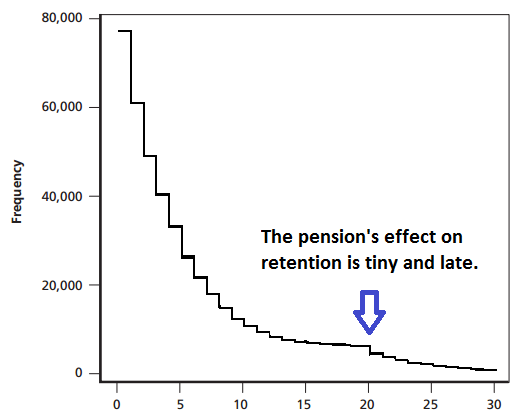
Back before Thanksgiving, we wrote about a new RAND report on the military's 20-year service requirement for eligibility to receive a pension. The report found that only 14 percent of enlisted personnel and 34 percent of officers remain for a full 20 years and qualify for a pension.
The report also analyzed the effects on retention efforts of offering such a back-loaded retirement plan. Not surprisingly, the current system provides little in the way of retention incentive to the vast majority of workers. Think about it. Imagine telling an 18-year-old Army recruity or even a 22-year-old officer that a nice pension awaits them…if they stick it out in the military for 20 years. The pension at the end of the tunnel may be comforting, but it probably isn’t enough to get them to stay, at least not by itself.
That’s exactly what shows up in the data. The graph below, modified from the RAND report, shows the number of enlisted personnel by the number of service years they have accumulated. As the graph illustrates, the Army recruits large numbers of enlisted personnel who mostly serve very short terms. Only a fraction of enlisted personnel make it to 10 years of service, let alone 20. For the vast majority of our Armed Forces members, the promise of a pension at 20 years means little. They're simply not willing to stick around that long for a pension.
That doesn't mean the pension has no retention incentive whatsoever, just that it can't possibly affect the majority of the workers. In the graph, the black experience line appears to flatten out around 17 or 18 years. Almost no one leaves then, because they might as well wait to hit the 20-year mark. And indeed, right at 20 years there's a small spike down of depatures. These are people who hung on just long enough to qualify for the pension. So the military's 20-year pension plan does have an effect on workforce retention; it's just tiny and comes too late to affect the majority of workers.
Teacher pensions have a very similar pattern, albeit one that's different in magnitude. Teachers, like members of the military, have very high rates of turnover in their early years. They may serve for a few years and then decide it's not right for them, but pensions probably don't factor very high into those decisions. (In fact, the pension plans themselves assume they have no effect on early-career teachers!) Later on, pension values rise dramatically as teachers near their state's normal retirement age. Just as with veteran military members, teachers know and understand their pension benefits and they tend to time their retirements accordingly.
As the RAND report models out, we don't have to stick with back-loaded pension plans that offer no benefits to the majority of workers. There are cost-effective alternative models that would offer more equitable, more portable benefits to all workers.
